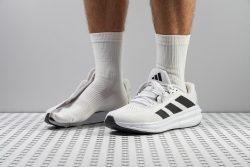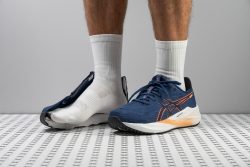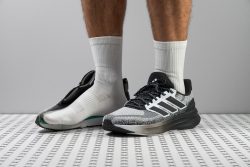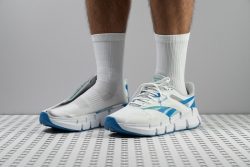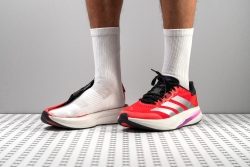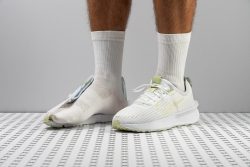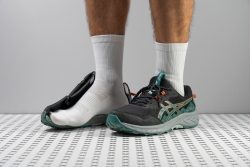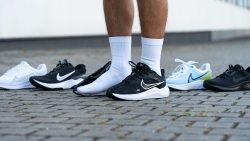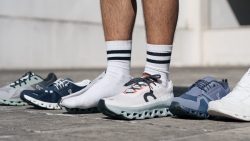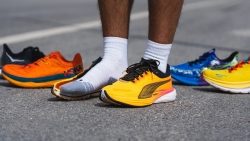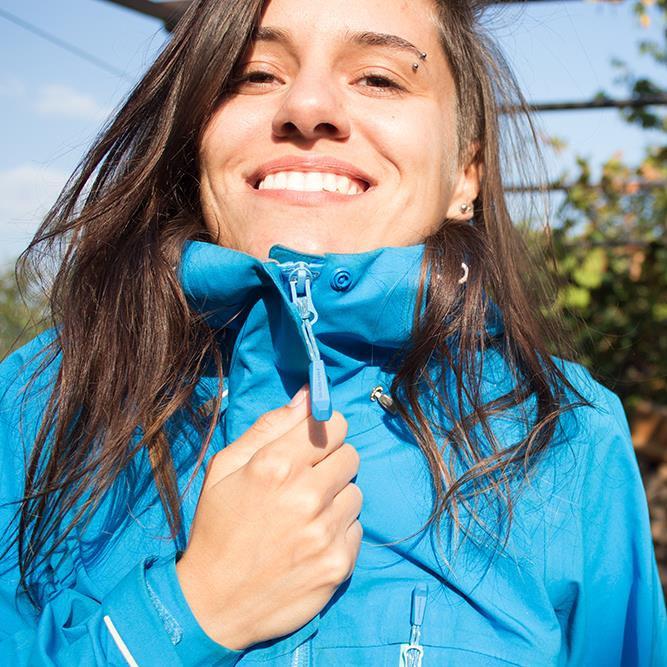7 Best Cheap Running Shoes in 2025
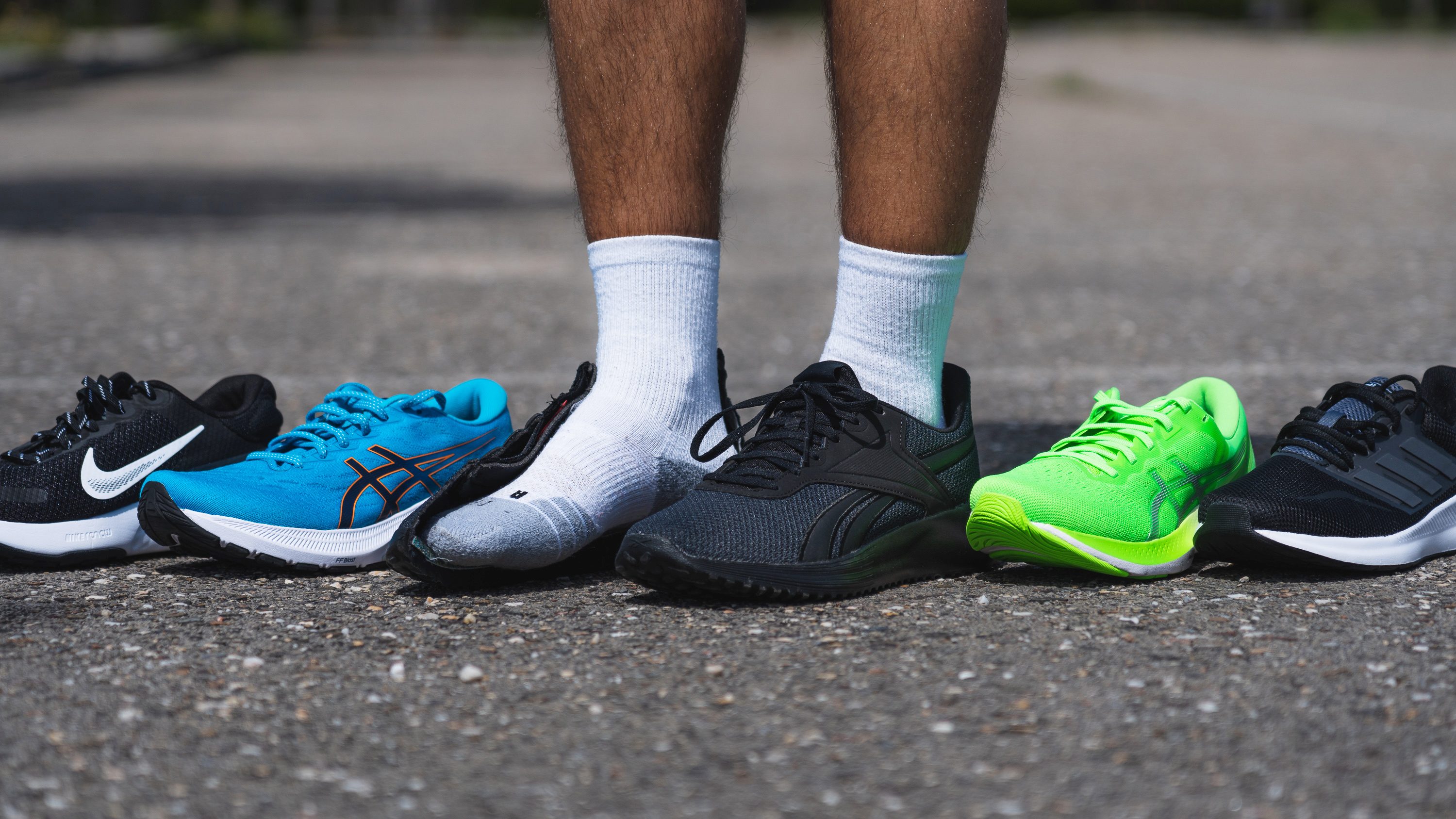
We buy shoes ourselves. We earn commissions when you buy through us, at no extra cost. Why trust us
Running shoes can be cheap (cost less than $100). Especially if you’re not chasing records or racing competitively.
After testing cheap running shoes both on the test runs and in our lab, we came up with the top picks in different categories. Depending on what you find the most important in your running shoes, we have options that highlight style, cushioning, durability, or a little bit of everything.
Also, we let you know about all the RunRepeat options that help you find a great deal, be it a price email alert, price history, or filters for discounts.
How we test cheap running shoes
We, a team of experienced shoe testers, are here to help you find the best deal. In our independent lab, we scrutinize every new release, seeking out the underdogs among budget-friendly models. Here is our process:
- We do multiple test runs in each pair.
- In our lab, we measure the shoe's shock absorption, energy return, flexibility, softness, breathability, durability, etc. We end up with 20+ data points that accurately describe each cheap running shoe. We even cut them in half to reveal everything - layers, materials, stitching.
- All running shoes are purchased with our own funds to avoid bias.
Best cheap running shoes overall
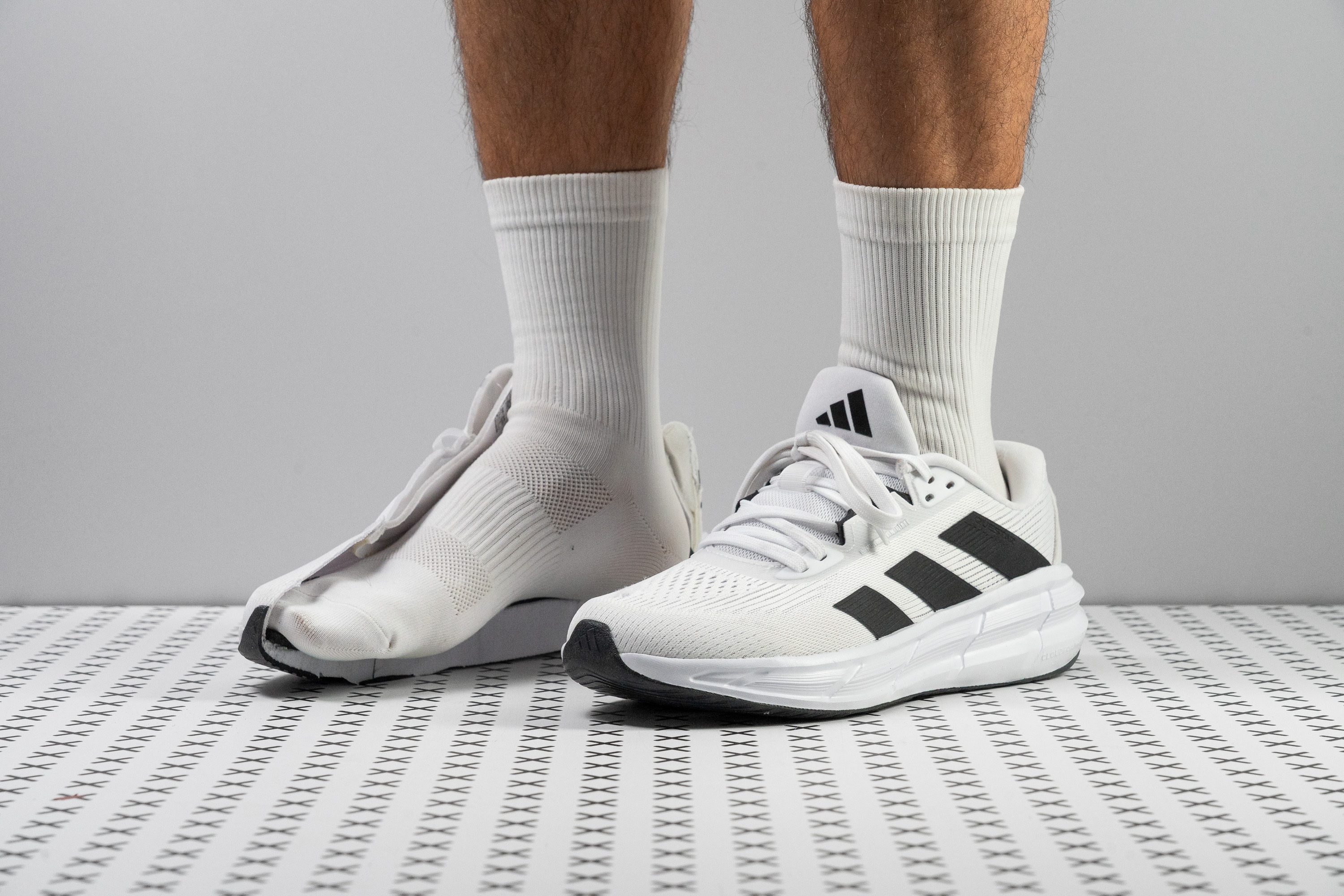












































What makes it the best?
Hours of lab tests and miles of running showed us that the Adidas Questar 3 is the ultimate cheap running shoe. At only $75, it’s way below the $100 budget and boasts remarkable durability for a longer shoe lifespan. Additionally, its flexibility and breathable nature create a sense of effortlessness in our ride.
The Questar 3 delivered outstanding resilience and toughness in our lab, even beating its more expensive counterparts. The shoe nailed our abrasive Dremel with only a minor 0.8 mm damage, proving it’s built to last.
The midsole displays amazing versatility, making it easy for us to move naturally. Our bend test confirms its flexibility by needing 7% less force than average to bend to 30 degrees. At this rate, it’s comfortable enough for walks and occasional gym workouts.
Above our feet lies a perforated upper that allows strong airflow. We undeniably enjoyed the cool sensation in our runs, which our smoke test mirrors with an impressive 4/5 rating. This score proves it’s a perfect year-round shoe.
However, while the ride feels smooth, it lacks spark. Those who crave an exciting ride will be satisfied with other models.
Pros
- Amazing value for money
- Excellent durability from heel to toe
- Breathable upper
- Stable ride
- Comfortable fit
- Great for casual wear too
- Ideal for heel strikers
Cons
- Rigid build
- Needs to lose some weight
- Subpar grip
Cheap running shoes with the best shock absorption
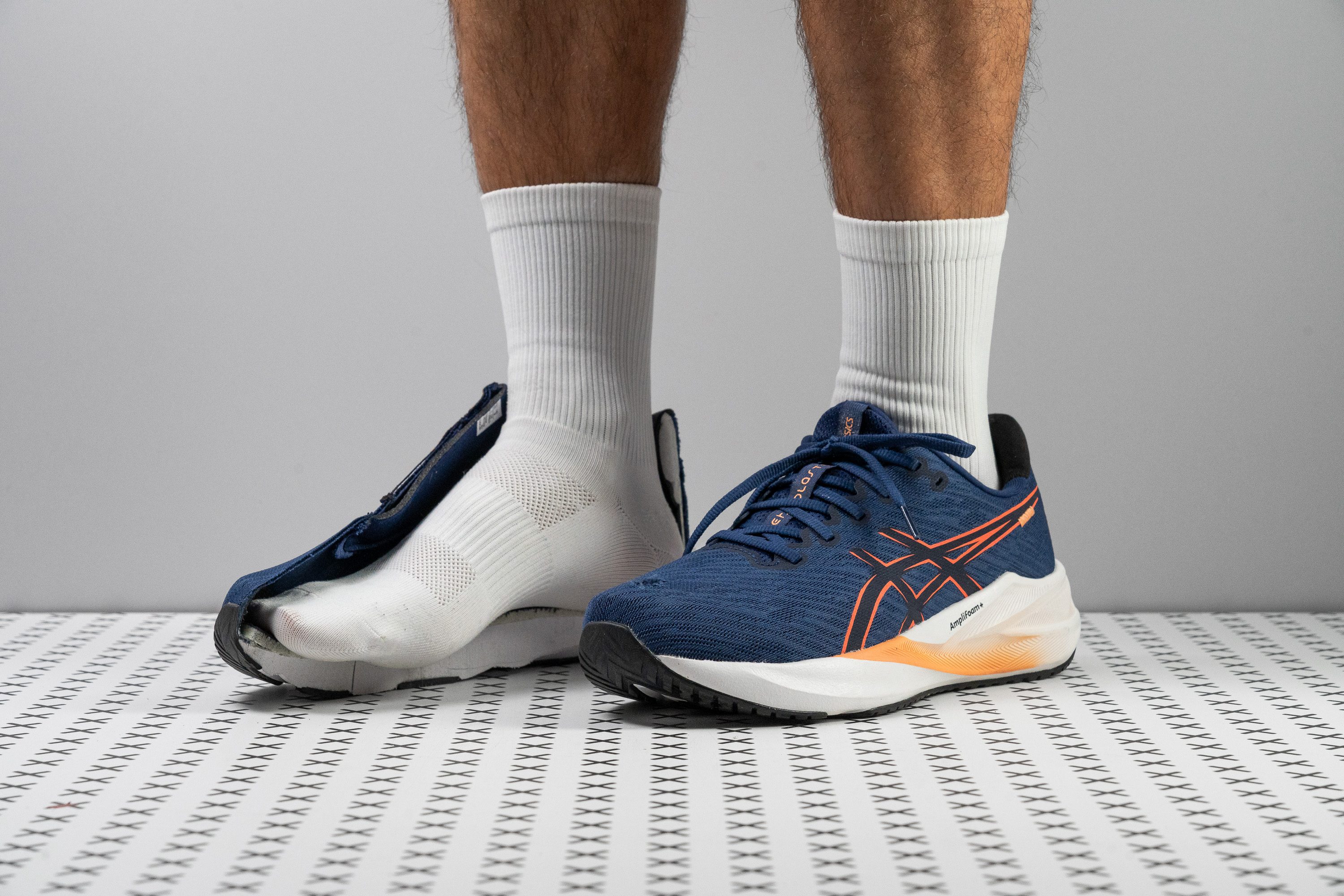













































What makes it the best?
At an accessible $80 price point, the ASICS Versablast 4 offers a well-cushioned underfoot experience and surprising longevity. Its plush sensation and broad base make it exceptionally comfortable and steady for daily mileage. Our feet already knew, but we further verified in the lab that it’s our cheap running shoe with the best shock absorption.
Despite being a budget-friendly shoe, the Versablast 4 offers relief through its 36.1/26.7 mm stack. Yet we credit most of its comfort to its exceptional impact protection. Our shock absorption test confirmed high scores of 127 SA (heel) and 109 SA (forefoot), ensuring zero pain strides and muscle protection.
To balance it all out, the base runs wide at 116.9/95.0 mm, securing our footing effectively. It has a central guidance channel, which helps center the ride.
In our Dremel test, the shoe exceeds the standard in the outsole. The rubber resisted wear better than average, with its small 0.8 mm dent, also evidenced by its minimal signs of use post-testing. We can expect Versablast 4 to last many seasons, which is outstanding for its price.
However, the downside is that its energy return is underwhelming. Those who prefer a more dynamic ride should invest in more responsive shoes.
Pros
- Stable ride
- Cushioned for long runs
- Good performance-to-price ratio
- Ideal for beginners
- Solid outsole durability
- Great option for heel strikers
- Can be used as a casual shoe
- Inspired by Novablast DNA
Cons
- Not for summer
- Upper durability concerns
- Narrow fit
- Probably a bit heavy
Best cheap running shoes for wide feet
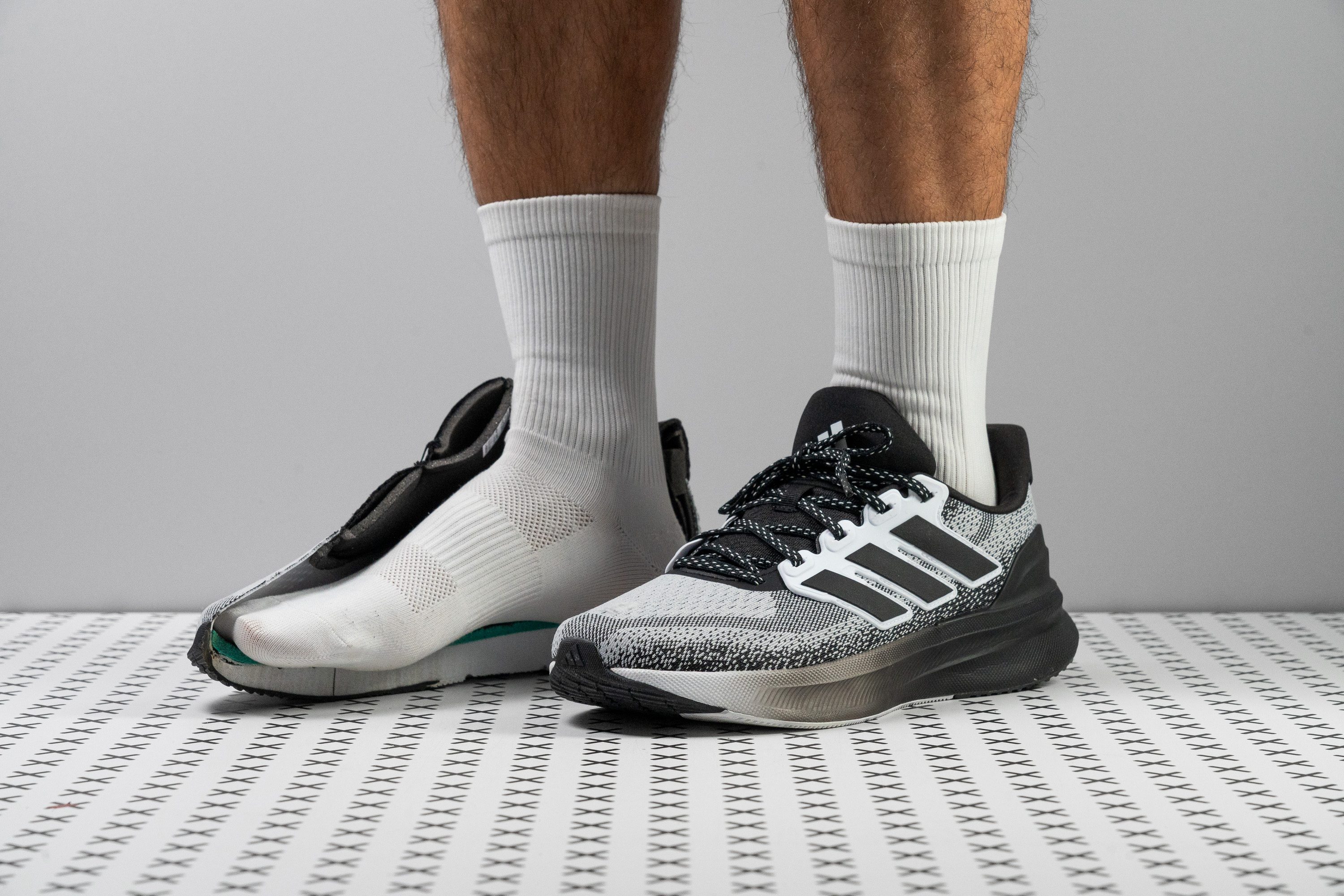













































What makes it the best?
For only $80, we enjoyed the Adidas Ultrarun 5’s versatility, comfort, and roomy fit. It felt cushioned for easy runs, without going overboard on the foam. Ultrarun 5 also impressed us in the lab with its spacious interior, making it our top cheap running shoe for wide feet.
We replicated the shoe’s fit using our solidified gel mold and measured the widest part at 97.6 mm. Compared to the 95.3 mm average, it felt kind to our broad feet and won’t make even those with bunions feel pressure points.
The midsole is easy to maneuver, and received a flexibility score of 15.0N in our bend test. Being at par with average, it confirms its comfort for daily use and other activities such as walking.
The 34.3/24.8 mm stack height we measured is also close to average, giving enough cushioning for slower-paced and shorter runs without adding unnecessary bulk to the shoe.
However, the ride feels flat. Runners who want more bounce should invest in shoes with more premium midsoles.
Pros
- Fantastic option for beginners
- Budget-friendly price
- Good durability
- Works well as a casual sneaker too
- Cozy step-in feel
- Good grip
- Ultraboost-inspired look
- Stable for heel strikers
Cons
- Feels bulky and bottom-heavy
- Lacks an energetic ride
- Runs a bit warmer than ideal
Best cheap running shoes for casual wear
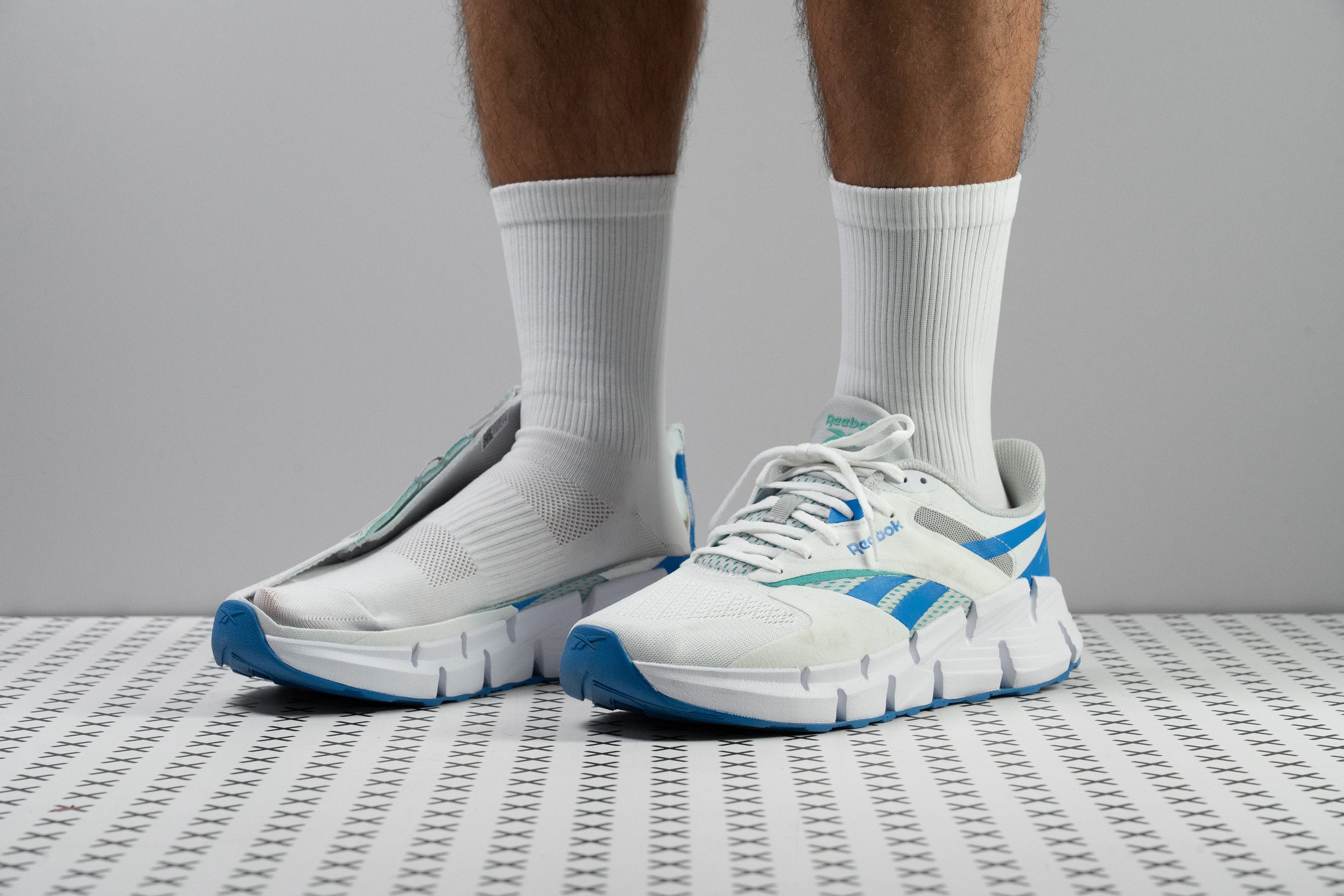











































What makes it the best?
Runners on a budget looking for an all-in-one shoe perfectly suit the Reebok Zig Dynamica 5. With its retro look and $90 price, it doubles as a sneaker. Lab evaluation shows its premium outsole delivering both traction and exceptional wear resistance, topped with a breathable upper. The average running shoe in our roster costs $146, making the Zig Dynamica 5 our best cheap running shoe for casual wear.
We enjoyed strutting the streets in this Reebok pair. Besides its stylish design, it delivers controlled footing, rain or shine. In our traction test, we recorded a high friction score of 0.55, showing 14.6% stronger grip than average.
Moreover, the rubber displays remarkable durability with its small 0.8 mm dent in our Dremel test. It’s a perfect option for daily beaters since it can last longer than the average running shoe.
Zig Dynamica 5 combines engineered mesh and overlays that allow strong airflow. In our smoke test, the air we pumped in escaped seamlessly, earning it a solid 4/5 in breathability.
However, its energy return scores are far from the average trainer. Therefore, those looking for a responsive ride should find alternatives.
Pros
- Eye-catching retro design
- Durable outsole
- Stable platform for heel strikers
- Budget-friendly price
- Solid traction even on wet surfaces
- Semi-gusseted tongue
- Works well as a casual sneaker
Cons
- Tapered, low-height toebox
- Lacks any speed
- Upper material is weak
- Feels heavy underfoot
Best cheap tempo running shoes
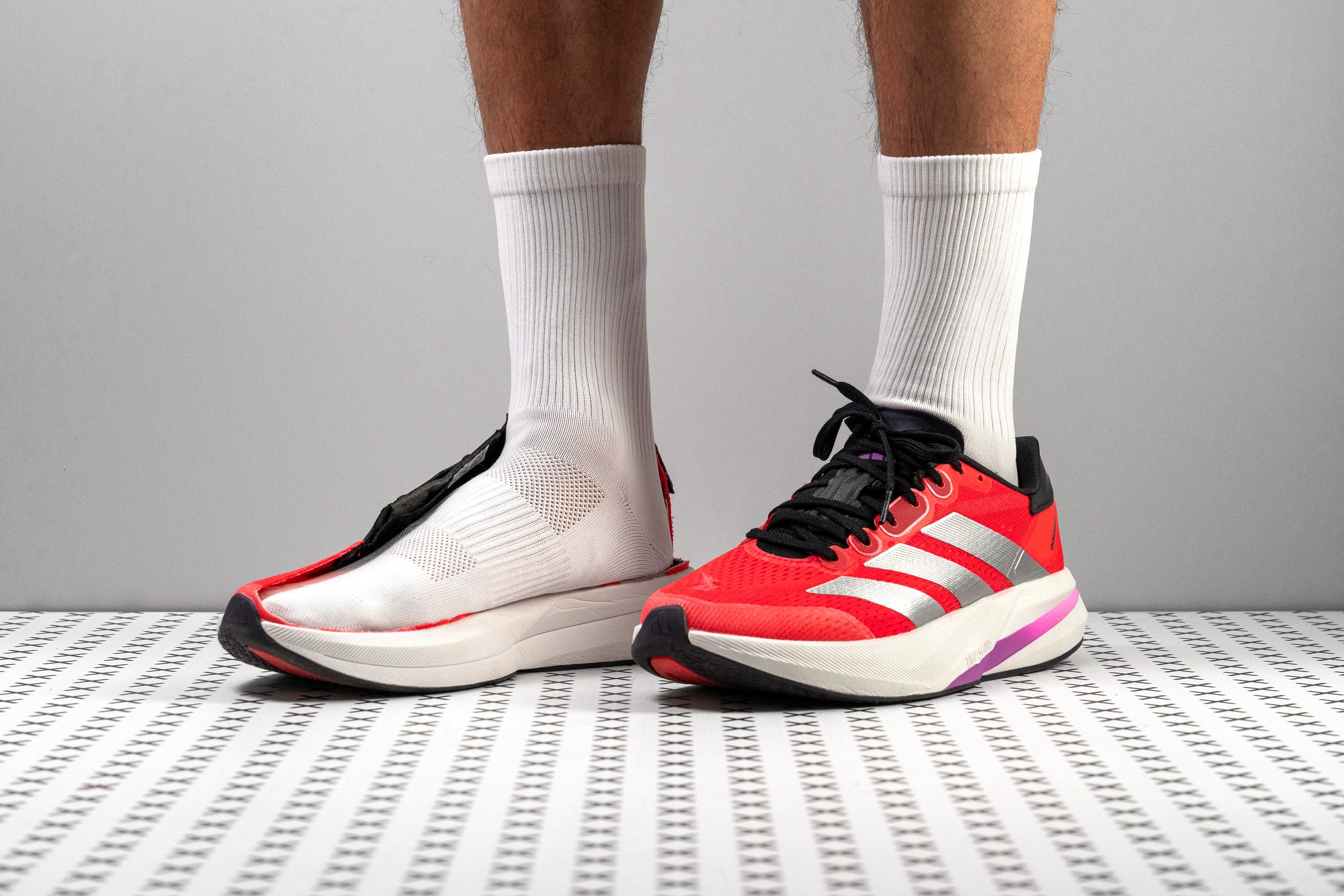













































What makes it the best?
The Adidas Duramo Speed 2 offers exceptional value as a protective and lightweight daily trainer delivering all-weather grip and unexpected durability and bounce in our lab and wear tests—rare features often reserved for pricier models. At $90, it’s 38.4% cheaper than average, making it our best tempo cheap running shoe.
The DS2 feels much more exciting than other budget-friendly shoes thanks to its Lightstrike foam, which offers a good spring to our strides. Though we recorded moderate energy return scores of 44.7% in the heel and 49.4% in the forefoot, these feel responsive enough for tempo, and are impressive for its cost.
What also boosts our agility is its lightweight 9.1 oz (258g) build. With every landing, we’re offered strong impact protection, particularly in the heel with its high 121 SA rating.
We enjoyed controlled footing whether it rains or shines. Our traction test records a 0.56 result, which makes its grip 14.3% stronger than average. Moreover, our runs and Dremel barely affected the outsole. With only 0.7 mm of wear, it can take the beating of daily use.
However, its narrow 85.9 mm heel may cause stability concerns for rear strikers. Those who feel more surefooted with a wider heel should skip this pair.
Pros
- Very affordable price
- Lightweight build
- Durable outsole
- Solid traction on dry and wet surfaces
- Big reflective elements
- Stable for midfoot and forefoot strikers
- Can be used for daily runs or tempo runs
- Ideal for beginners
Cons
- Very low energy return
- Not much shock absorption in the forefoot
- Upper durability should be better
- Limited heel stability
Best lightweight cheap running shoes
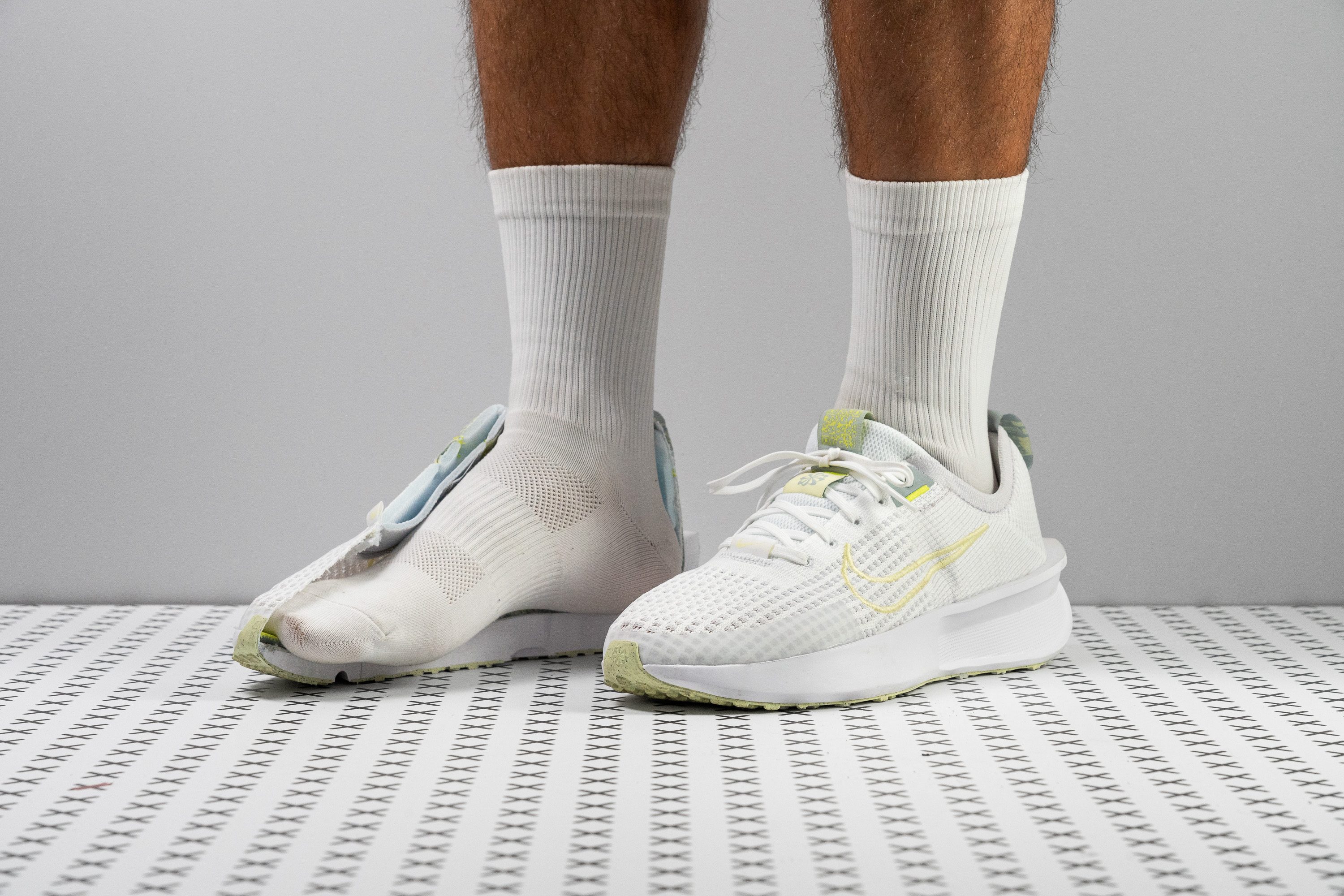

















































What makes it the best?
Among cheap running shoes, the Nike Interact Run was kind to our feet and finances, making it the best lightweight shoe in the category. It features the premium, plush, and airy Flyknit upper despite being an $85 shoe. Our lab confirms it’s an exceptionally versatile shoe that’s great for casual runs and daily activities because of its airiness and flexibility.
Interact Run's effortless sensation is verified by its 8.5 oz (241g) reading on the scale, making it 9.1% lighter than average. With one less load to carry, we’re able to complete our runs in a relaxed manner. This is mostly attributed to its minimal cushioning, which also leads to higher flexibility. True enough, it emerged 17.1% less resistant than average in our bend test, making it comfortable for daily walks and errands.
The upper’s comfort is prominent upon slip-on, feeling soft to the touch and breezy on the foot. Our microscope reveals a dense Flyknit material that’s dotted with ventilation holes for free airflow. Our lab results align with our observations, earning a 5/5 breathability score. While most shoes perform inversely for resilience, Interact Run breaks the norm with a perfect durability score.
However, we find the cushioning lacks support and energy return. We recommend that more serious runners invest in other shoes.
Pros
- Ideal for hot climates
- Perfect for everyday life
- Exceptional comfort
- Fantastic value
- Great for beginners and heel strikers
- Flyknit upper under $100!
- Really lightweight
- Upper durability
Cons
- Not very bouncy
- Outsole lacks grip
- Only for short and easy runs
Best cheap trail running shoes
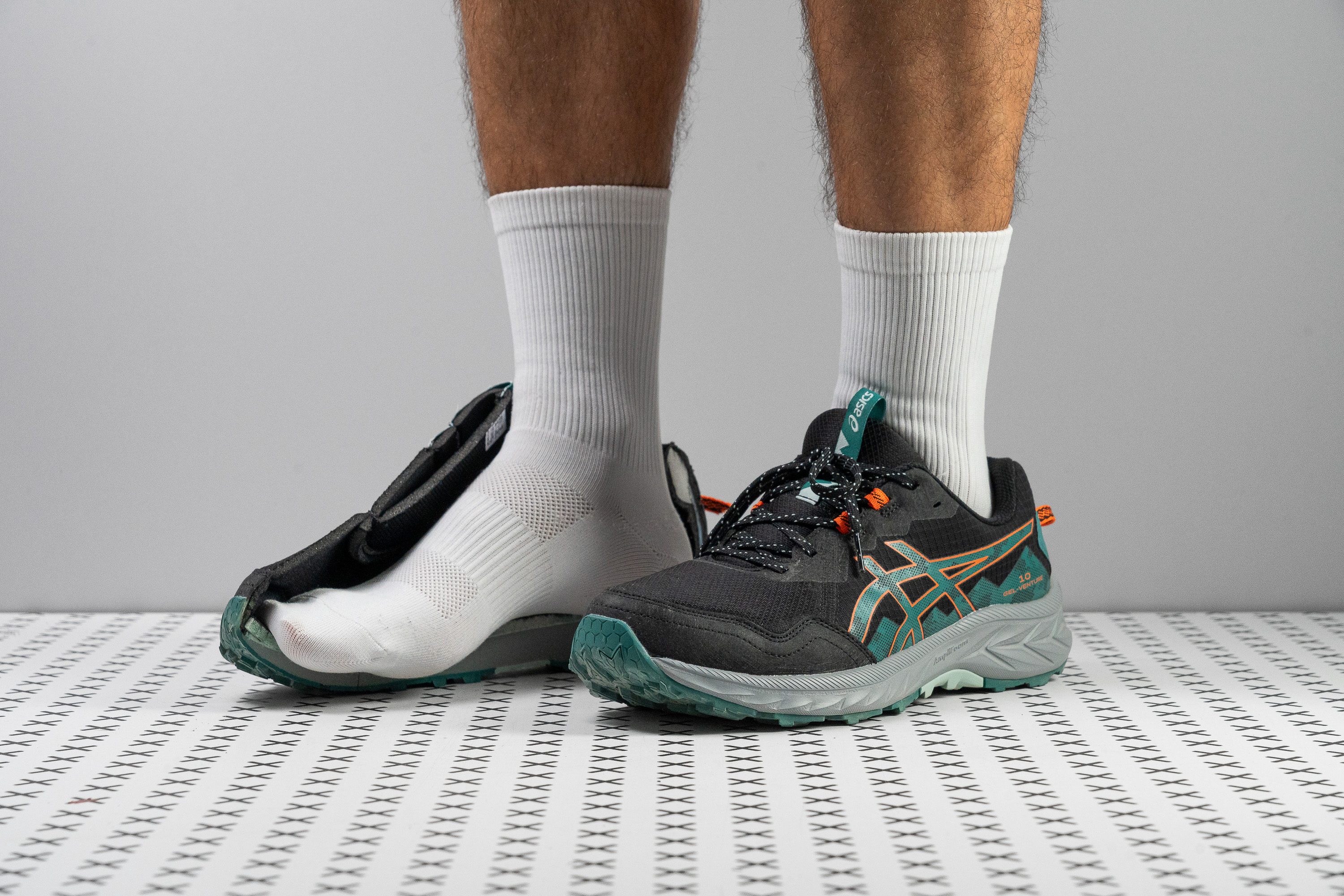











































What makes it the best?
The ASICS Gel Venture 10 made sure we can adapt to various surfaces with its flexible midsole and versatile lugs. Given its $80 price, it exceeded expectations in our lab tests by displaying remarkable durability, making it our best cheap trail running shoe.
We enjoyed the natural ride, which felt good for long hours of wear and even other activities, such as walking. The midsole flows effortlessly with our feet, proven by our bend test, with a rating 18% more flexible than average.
Underfoot, the outsole gave us the control we needed without being too overpowering. We measured the lugs at 3.7 mm, just the right depth for up to moderate terrain. We tested for its durability with our Dremel and showed a minimal 0.6 mm damage, showing stronger wear resistance compared to its pricier counterparts.
We also tested the upper to see if it can handle sharp rocks or protruding roots that we may encounter. Its performance in our Dremel test shows we don’t need to worry, with its impressive 4/5 toebox durability score.
However, the toebox tapers more aggressively than the standard. Therefore, GV10 is limited to those with narrow feet.
Pros
- Fantastic durability
- Amazing value
- Ideal for beginners
- Softer Amplifoam midsole
- Versatile for trail, travel, casual wear...
- Improved upper
- Plush tongue with pressure-free lacing
- Trail-inspired details at budget price
Cons
- Only for narrow feet
- Heavy
- Low shock absorption and energy return
4 ways RunRepeat helps you find cheap running shoes
We've made it easy to find the best deal or to notify you once the price drops! Here's what you can use on our website to find great deals:
- Price alert
- Price filters
- Price history
- Deals
RunRepeat Price Alert
If you have a price cap on a shoe you want to buy, you can use Price Alert. Just click on Add price alert and enter your email.
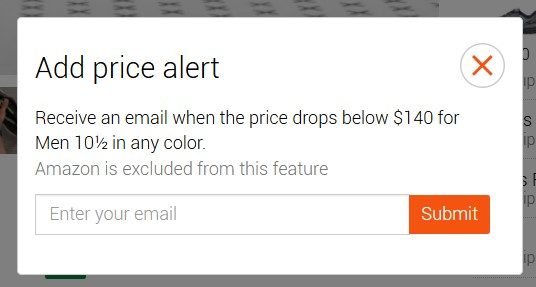
We will notify you once the price of the shoe, in the selected size, drops below the current one.
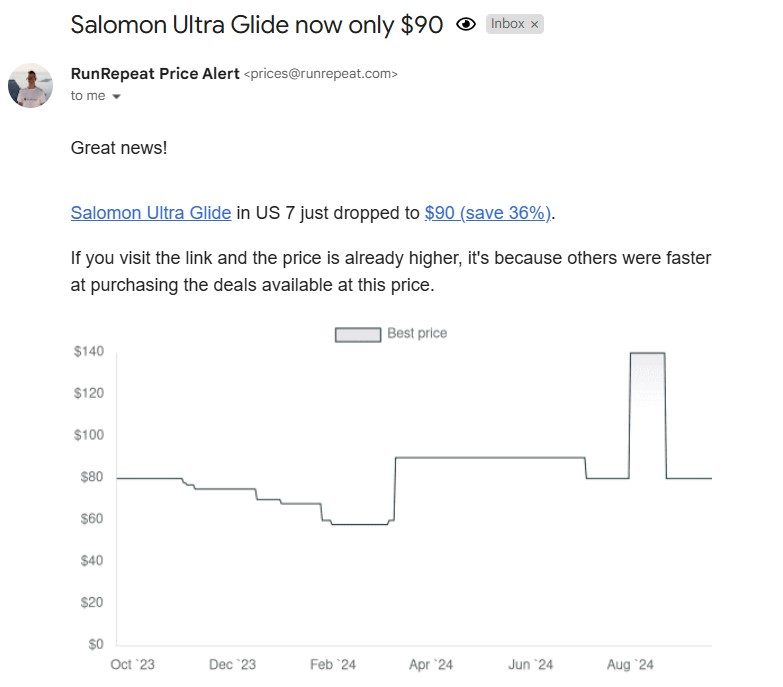
Price filters
On the page where we list all the running shoes we have tested, in the field and in the lab, you can use a “Cheap” filter to immediately filter only those that cost less than $100. You can also use other filters that correspond to your budget.
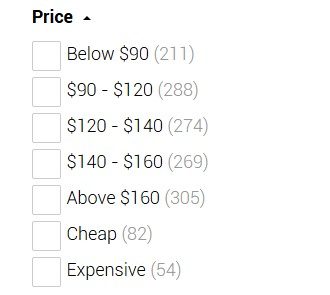
Price history
Having the price history is meaningful because you can learn a lot from it, like:
- Is the price actually lower on Black Friday?
- How does seasonality affect the shoe you want to buy? If it’s a waterproof (Gore-Tex) shoe, is it more expensive in autumn and discounted in spring? Are women’s shoes cheaper around Mother’s Day?
- Is the current price around the average or maybe you’re lucky enough to visit the page when the best deal ever is available?
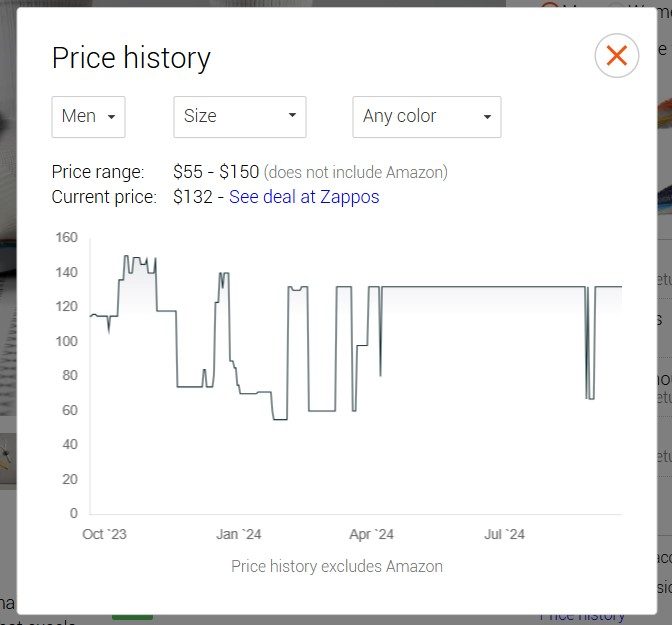
Price history is more precise, of course, if you choose gender, size, and maybe even color.
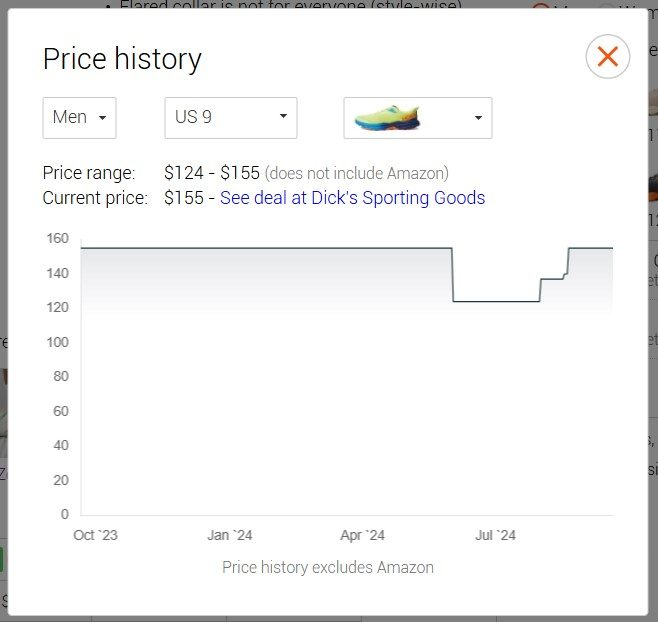
Deals on RunRepeat
At any moment, you can visit our Deals page and look for running shoes that have been discounted by at least 30% (some more than 70%!).
Context needed when it comes to shoe prices
In our shoe reviews, you can also find the chapter on price. This is where we elaborate on the shoe’s value, whether we think it’s worth the money or not, and it’s where you can see how the shoe in question compares to the other shoes from the same category when it comes to the price.
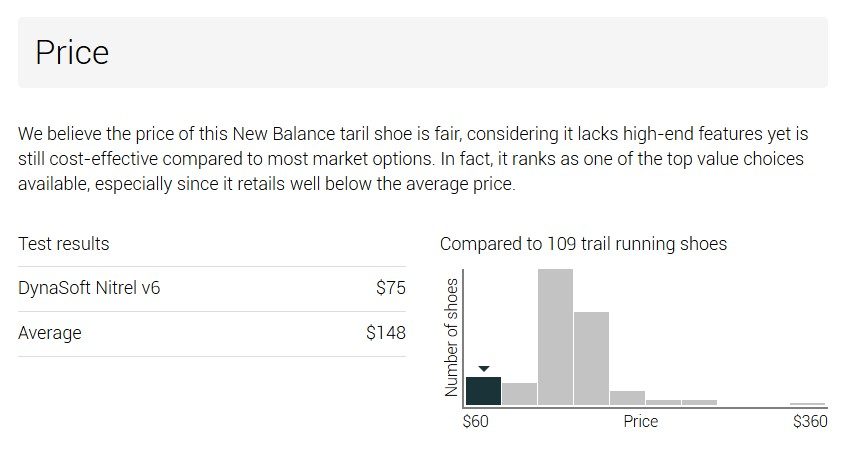
Average price of running shoes per brand
This is another piece of the puzzle or more context one could use when looking for cheap shoes.
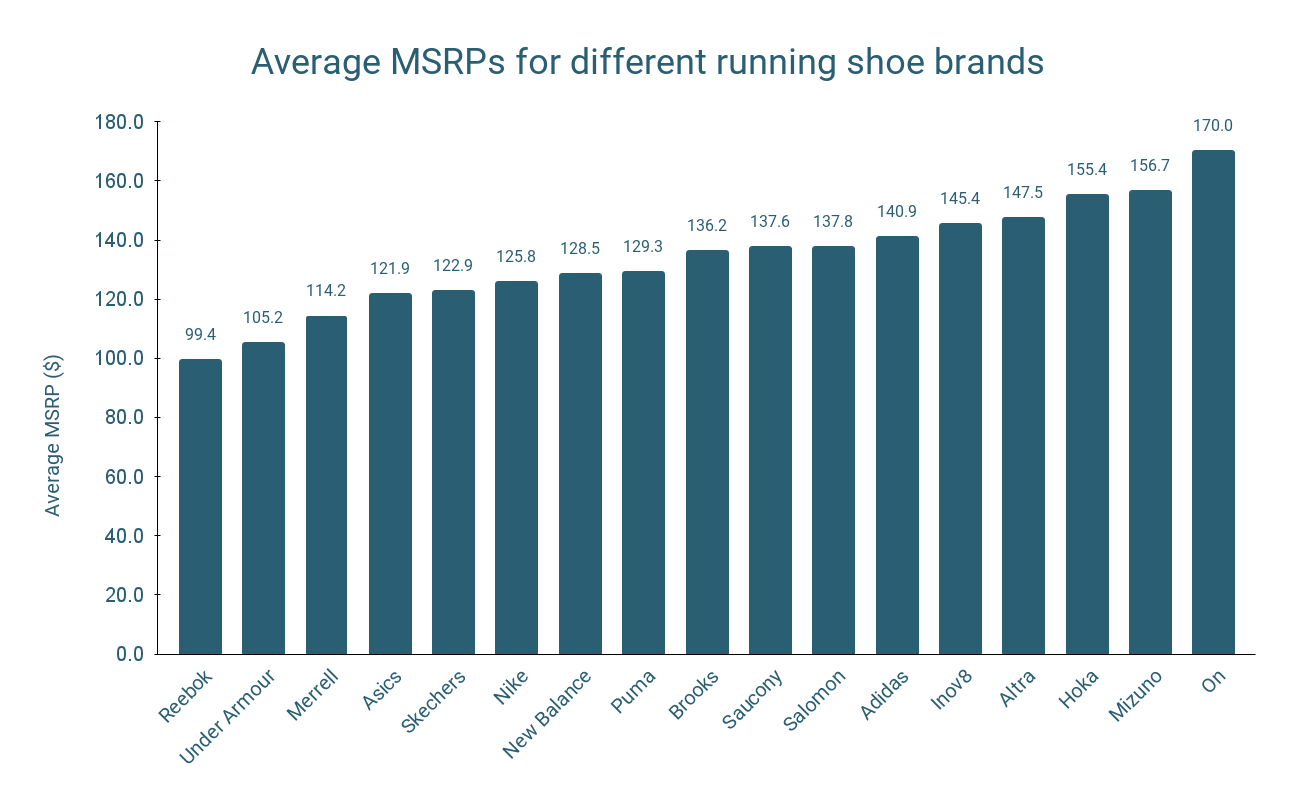 Again, using our database, we’ve pulled the numbers for average prices of running shoes. Keep in mind that we used MSRP, which stands for the manufacturer’s suggested retail price or the price once the shoe was released, not when it was discounted.
Again, using our database, we’ve pulled the numbers for average prices of running shoes. Keep in mind that we used MSRP, which stands for the manufacturer’s suggested retail price or the price once the shoe was released, not when it was discounted.
Which brands make cheap shoes?
Based on our database, Inov8, Hoka, Mizuno, and On do not make cheap shoes (shoes that cost less than $100). For other brands, we’ve listed the percentage of shoes that cost less than $100 in the chart below.
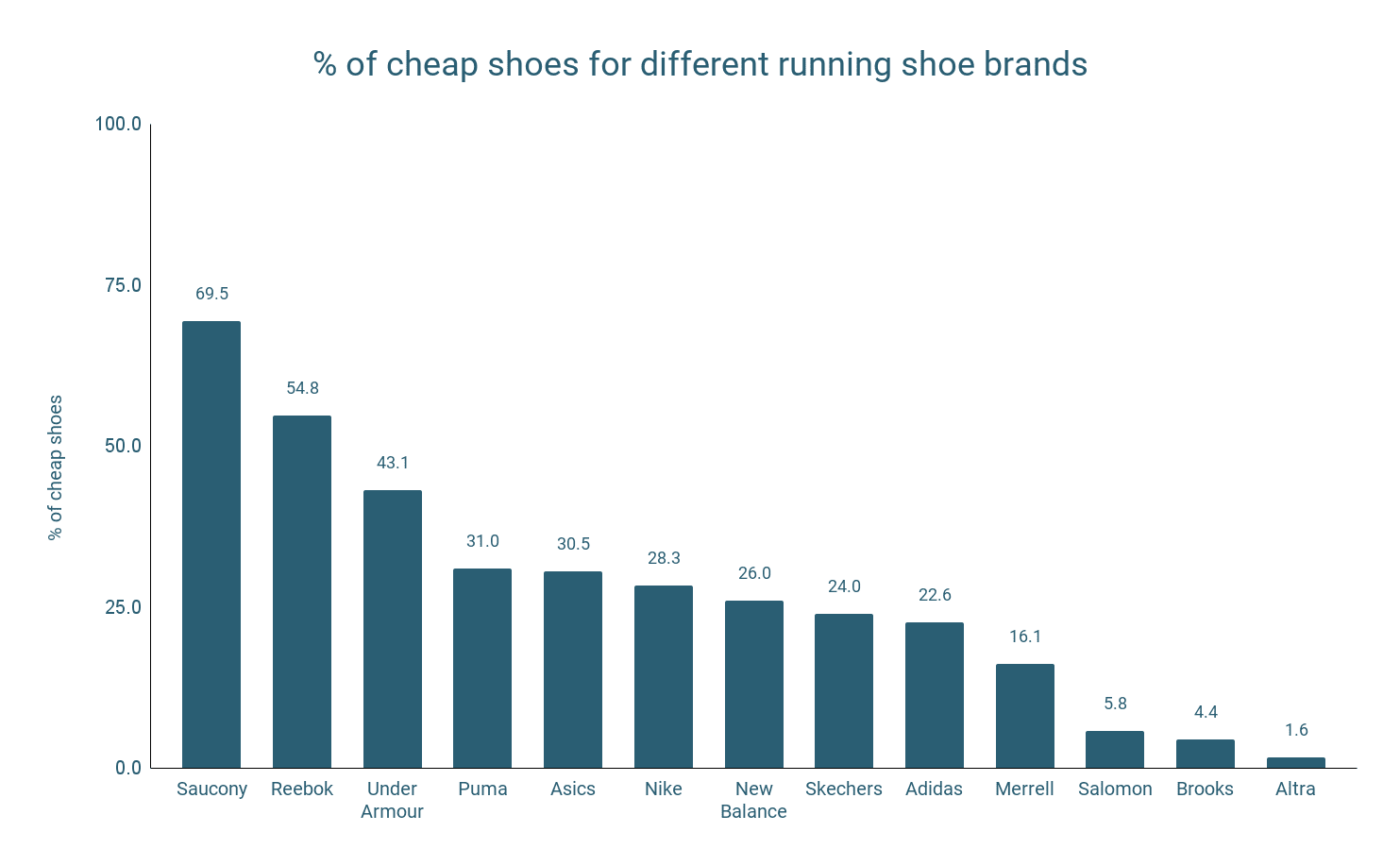
The line that separates inexpensive from expensive running shoes is the price: $100. It’s nothing official, but a wide-spread notion.
What might support your decision to buy a cheaper pair of running shoes is our study on shoe prices. According to RunRepeat’s research on expensive and affordable running shoes people are 8% less satisfied with expensive running shoes.
3 general tips for finding cheap running shoes
- Browse online stores. Usually, they allow for shoes to be filtered by price or discount. Additionally, shoes are often cheaper online as there’s no cost related to owning a specialized shop, hiring people to work there, etc.
- Pay attention to older models, they tend to be discounted more often than new models. Especially if you’re offline shopping, smaller shops might have those models on sale.
- Exercise caution if buying on Black Friday. Turns out sneakers are cheaper on 66% of days throughout the year than they are on Black Friday. Worth keeping in mind when buying running shoes too.
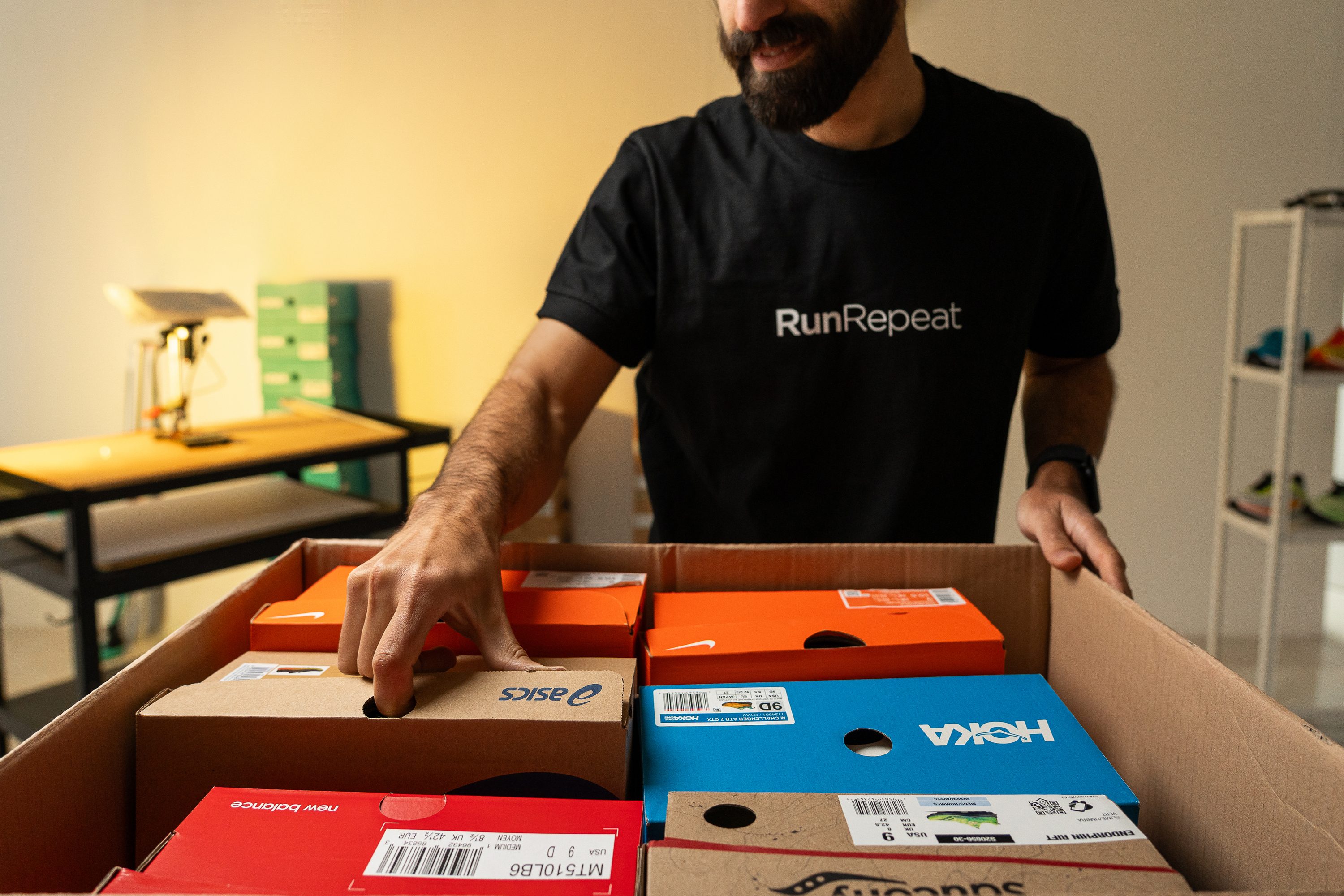
When looking for older models, on RunRepeat, you can also select a size and then add older models to the comparison table to have a clear overview of the current price (yay!) and other features that might have changed and are relevant to you.
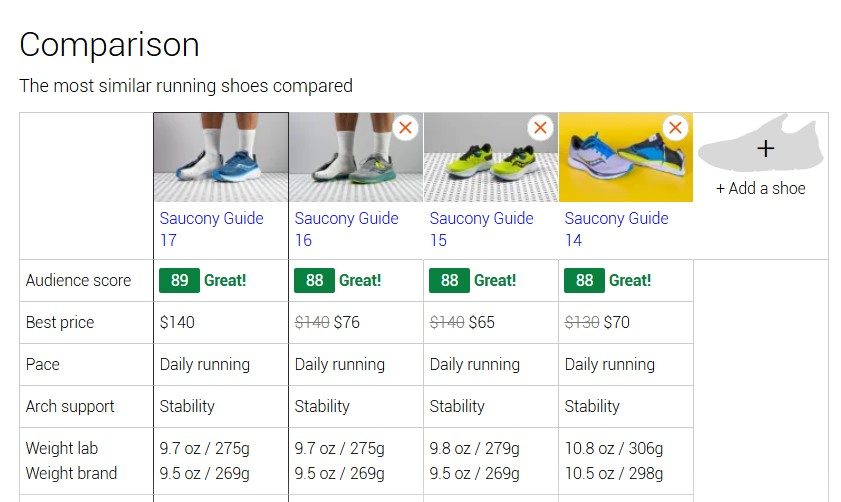
What makes running shoes expensive
$110-130 will probably get you the most value for money. The premium price of $150-350 simply isn’t always worth it. When looking for a cheap running shoe, people tend to stay in the $60-80 range.
Keep in mind that shoe prices are defined by:
- Shoe features - e.g. carbon-fiber plate, premium foam, GTX membrane, etc. These might work wonders for specific conditions but also might not be needed for your every day running;
- Marketing - the bigger the campaigns - the more expensive shoes get;
- Timing - do you want the new shoe as soon as it’s available? Or even pre-order? The more you wait, the greater the chances to find that certain model discounted.
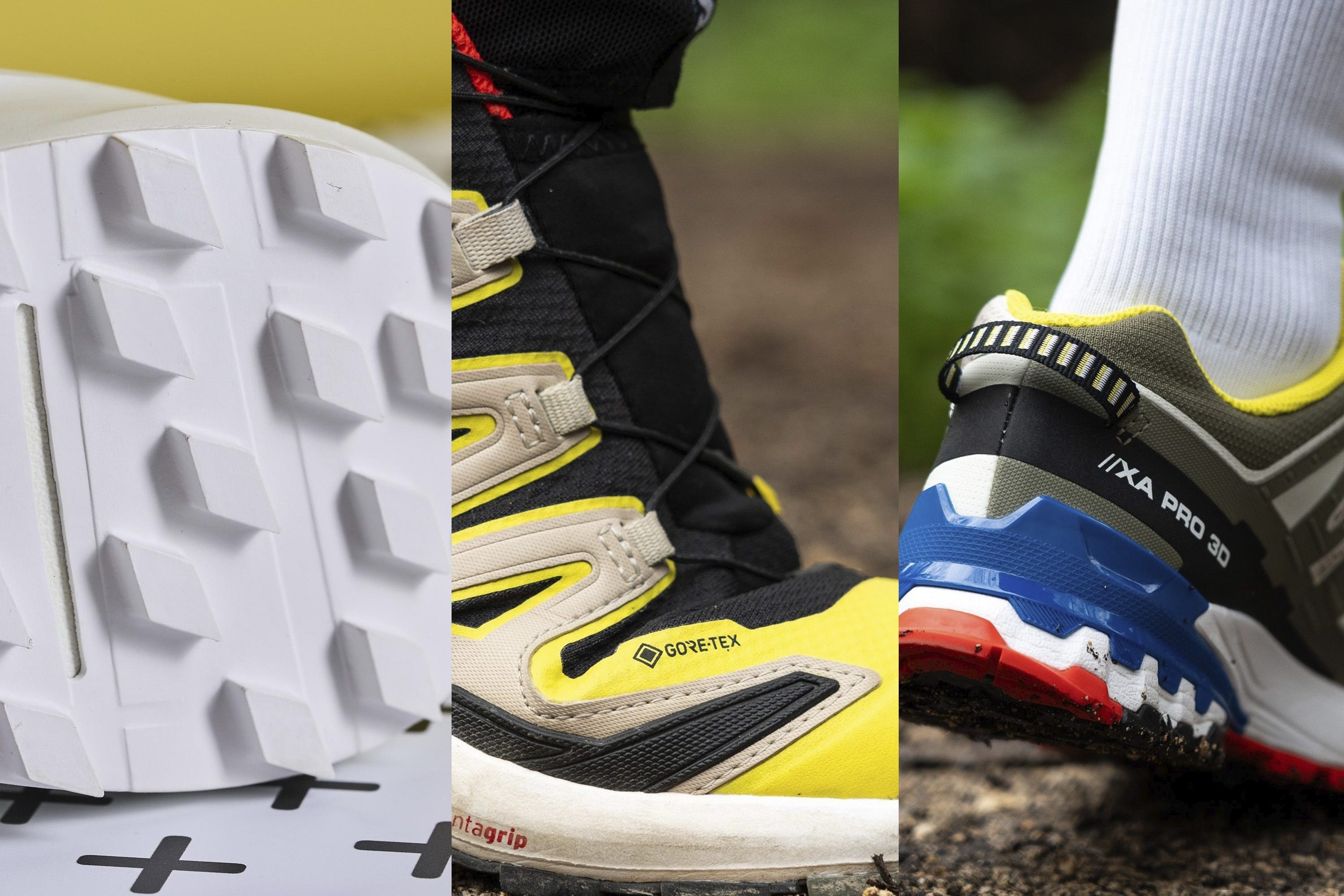
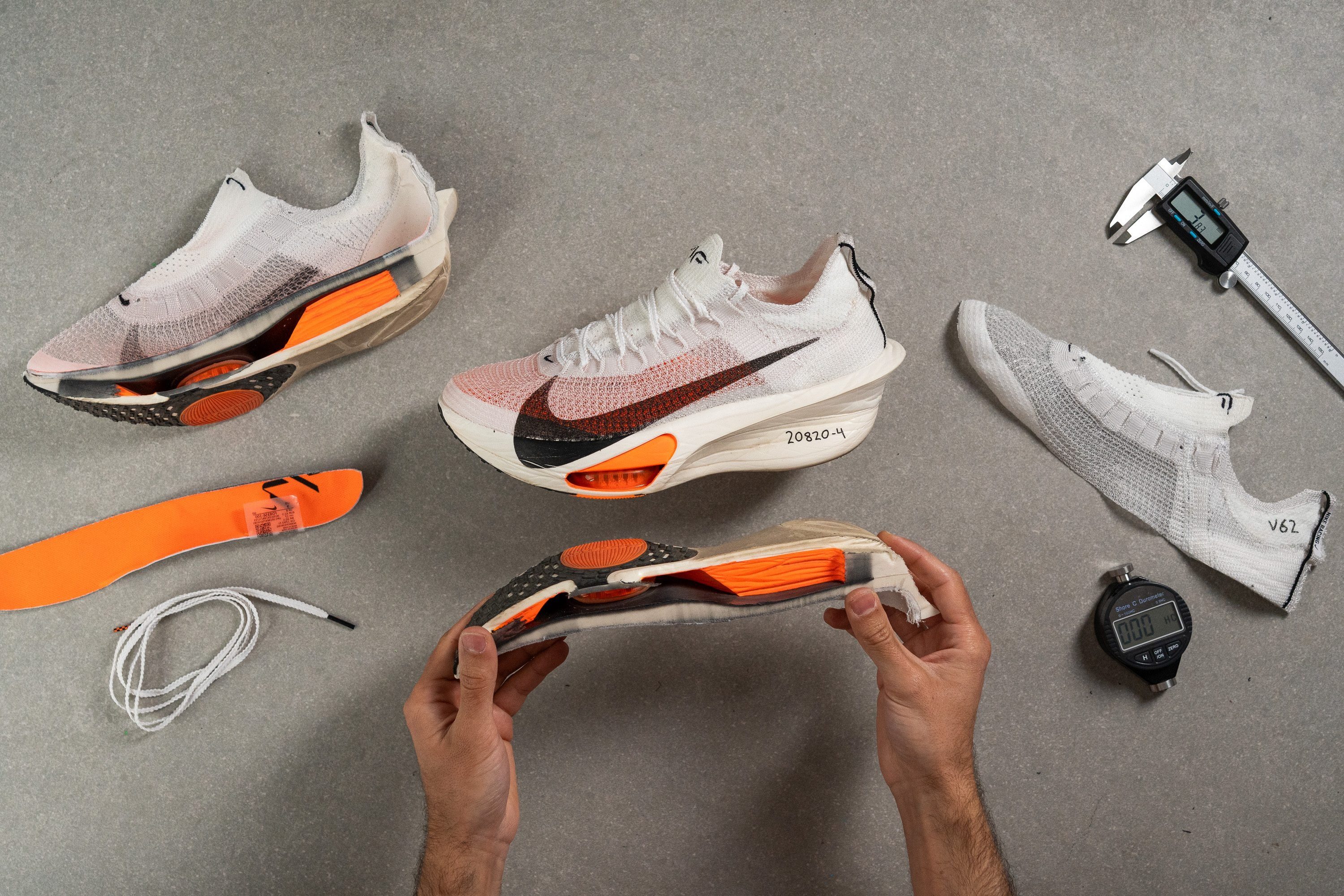
Downsides of getting cheap running shoes
Cheap running shoes can be quite comfortable, however, what they usually lack is a) new technologies, and b) durability.
When it comes to new technologies, this means that you’ll be getting a standard foam, not a premium one. This is not at all a bad thing, most of the daily trainers have the standard one. However, premium foams are way more responsive, leg-saving, and, well, expensive.
Other technologies you might be missing out on are: a carbon-fiber plate for extra stiffness and propulsion (when combined with premium foams), a waterproof membrane like Gore-Tex, maybe even a rock plate (in trail shoes, for extra protection), high-quality insoles, and so on.
When it comes to durability, you can always check how the shoe performed in our durability tests before purchasing it. If you’re not familiar with our durability tests, we perform them on the toebox, outsole, and heel padding.
Testing the durability of the toebox in RunRepeat lab
Once we’ve done the damage, we assess it on a 1-5 scale, where 5 is the most durable.

Different levels of toebox damage in running shoes
We apply the same process to the heel padding: press a dremel against it using the same force, RPMs, and duration.

Testing the durability of the outsole in RunRepeat lab
When examining the damage on the outsole, we don’t have to assess it because we have a tool that measures the exact depth of the dent: a tire tread gauge. The shallower the dent, the more durable the outsole, of course!


